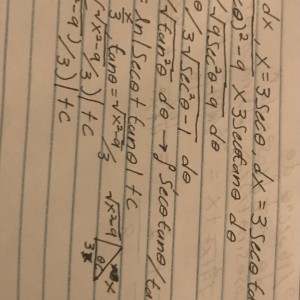Spot my mistake and fix it so that it matches with the correct answer. The problem is calculus based.
The problem is: what is the integral of [1/root(x^2-9)]dx? The image is posted below. The answer is supposed to be ln |(x+root(x^2-9)| +C. Obviously I got pretty close but I can't seem how to eliminate the 3 in the solution. I'm genuinely stuck at this problem. I also apologize that I set the time to less then an hour but I really need to get this done to tonight.
Answer
Answers can only be viewed under the following conditions:
- The questioner was satisfied with and accepted the answer, or
- The answer was evaluated as being 100% correct by the judge.
1 Attachment
4.8K
-
Wow, I never saw it that way. Thanks!
The answer is accepted.
Join Matchmaticians Affiliate Marketing
Program to earn up to a 50% commission on every question that your affiliated users ask or answer.
- answered
- 1451 views
- $2.00
Related Questions
- Method of cylindrical shells
- Find the amount of work needed to pump water out of full spherical tank
- Prove that $\int _0^{\infty} \frac{1}{1+x^{2n}}dx=\frac{\pi}{2n}\csc (\frac{\pi}{2n})$
- Finding only one real root for a function
- Is my answer correct?
- Explain proof of directional derivative
- Vector-Valued Equations
- A question about the mathematical constant e.



Sorry the answer is supposed to be ln |root(x^2-9) + x| +C